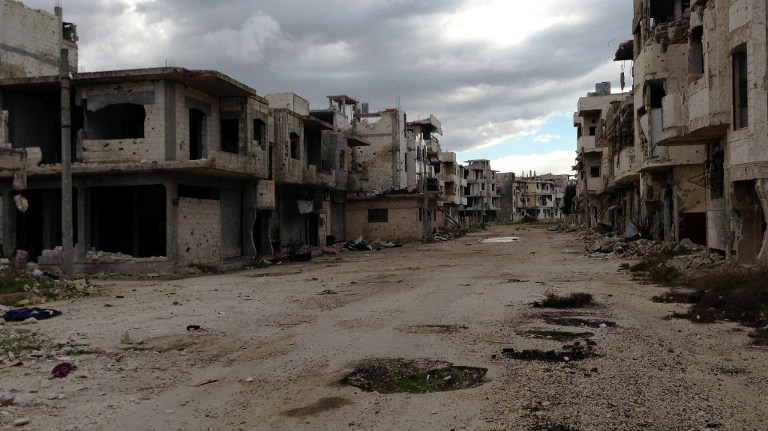SUMMARY
This is AI generated summarization, which may have errors. For context, always refer to the full article.

HOMS, Syria – Nearly one year after the fierce Syrian army takeover of Baba Amr, the former rebel stronghold in the central city of Homs, residents eke out a living in a devastated neighborhood frozen in time.
Bullet-pocked walls, collapsed balconies, fallen telephone poles and abandoned apartments make up the desolate scene.
Baba Amr gained notoriety when hundreds of Syrians were killed during two months of army bombardments and combat with the outgunned rebels.
It was also where veteran journalist Marie Colvin of the Sunday Times and budding French photographer Remi Ochlik met their death in an regime raid on an activist media center in February last year.
A month later, Assad made a rare visit to the devastated district to mark the “victory” of his troops, offering promises broadcast on state television that Baba Amr would rise again and return to “normal life”.
But 11 months later, the wind whistles through bombed-out buildings and the streets are littered with rubble, an AFP journalist reported during a tour of the district escorted by government troops.
There is no sign of reconstruction and most of the district’s 35,000 inhabitants have not returned.
The few who did come back are furious with the belligerents for prolonging what they deem a futile battle, blaming rebels who bit off more than they could chew and the regime that laid waste to their neighborhood in retaliation.
On a street corner leading to the cemetery of the eastern district, Fatima sits on the sidewalk alongside her husband, watching their grandchildren playing in the street.
“I do not want to talk about the past, it is a real human tragedy,” said the sexagenarian, who had was “lucky” to find her home still standing.
“We were pulled into this conflict and neither side was concerned about us or our children’s lives. I detest them all,” she said.
“It was really a war, but everybody lost,” said her eldest son, 34.
In the western part of Baba Amr, the former rebel headquarters where Marie Colvin and Remi Ochlik were killed, an oppressive silence greets journalists as they walk about the district, followed by soldiers.
But one man felt the urge to approach and tell his account.
For 33-year-old Khaled, the din of battle was still vivid: “You could not even stick your nose out the window.”
“We were surrounded by army fire on one side and the gunmen on the other,” said the young man, who returned with his wife and four children to repair their home.
At a local cooperative, a men and women queue patiently to buy gas cylinders for cooking and heating. But at the sight of journalists they turn away their weary faces.
“People here are tired of the media,” a soldier said.
The only sign of hope is that the three neighborhood schools have reopened their doors.
Samer, 12, is eager to go back to class after missing a year of his studies.
“A lot of my friends left, so I had to make new friends,” he said.
With no end in sight to the conflict, which has left hundreds of thousands displaced or refugees in neighboring countries, Baba Amr offers a stark illustration of the devastating effect of war on the country’s urban fabric.
According to one soldier accompanying the journalists, those who have returned to Baba Amr are not all residents.
“There are many displaced families who came seeking shelter here after the fighting ended,” he said.
Authorities estimate the destruction at $33 million.
But as survivors await the reconstruction of Baba Amr to get under way, they are lost in painful memories and deeply bitter.
“How will my life be different if Assad stays or goes?” says Khaled. – Rappler.com
Add a comment
How does this make you feel?
There are no comments yet. Add your comment to start the conversation.